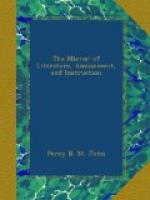By A Novice in the art.
(For the Mirror.)
--------------Our first father Smiled with superior love, as Jupiter On Juno smiles, when he impregns the clouds, That shed May flowers, and pressed her matron lip With kisses pure. Par. Lost, b. 4, 1. 499—502.
--------Kissing the world begun, And I hope it will never be done Old Song.
Kissing has been practised in various modes, and for various purposes, from a period of very remote antiquity. Among the ancient oriental nations, presents from a superior were saluted by kissing, to express gratitude and submission to the person conferring the favour. Reference is made to this custom, Genesis, ch. xl. v. 41, “According to thy words shall my people be ruled;” or, as the margin, supported by most eminent critics, renders it, “At thy mouth shall my people kiss.” The consecration of the Jewish kings to the regal authority was sealed by a kiss from the officiator in the ceremony: 1 Sam. ch. x. v. 1. Kissing was also employed in the heathen worship as a religious rite. Cicero mentions a statue of Hercules, the chin and lips of which were considerably worn by the repeated kissing of the worshippers. When too far removed to be approached in this manner, it was usual to place the right hand upon the statue, and return it to the lips. That traces of these customs remain to the present day, kissing the Testament on oath in our courts of judicature, and kissing the hand as a respectful salute, afford sufficient evidence. But it is with kissing as a mode of expressing affection or endearment that we are principally concerned, and its use, as such, is of equal (perhaps greater) antiquity with any of the preceding usages. To the passage cited, MIRROR, No. 357, by Professor Childe Wilful, on this subject, may be added the meeting of Telemachus and Ulysses on the return of the latter from Troy, as described, Odyssey, lib. 16, v. 186—218; and the history of the courtship of the patriarch Jacob and the “fair damsel” Rachel, Genesis, ch. xxix. v. 11. This last authority, though it must be acknowledged not so classical as the foregoing, is nevertheless much more piquant, being perhaps the oldest record of amorous kissing extant. Thou seest, therefore, courteous reader, that this “divine custom,” in addition to the claims upon thee which it intrinsically possesseth, and which are neither few nor small, hath moreover the universal suffrage of the highest antiquity; thou seest that its date, so far from being confined to the Trojan or Saxon age, can with certainty be traced to patriarchal times; yea, verily, and I cannot find it in me to rest here, without conducting thee to an era even more remote. Revert thine eye to the motto at the head of this chapter. Doth it not carry thee back in spirit to the very baby hours of creation, the “good old days of Adam and Eve?” and doth it not represent unto thee this




